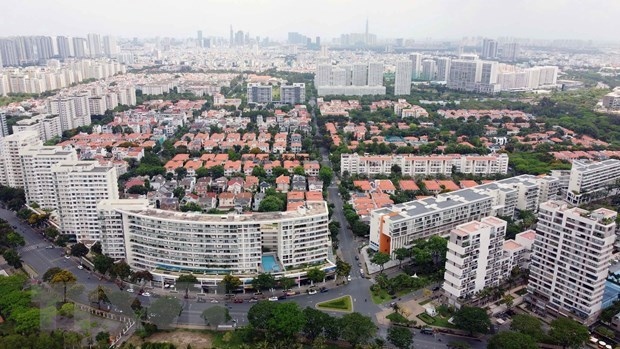Growth prospect of absorption rate looks promising in Vietnam
In Vietnam's real estate market, the leasing demand also recorded positive signals, with the amount of absorption area in Ho Chi Minh City and Hanoi in the first two quarters of 2021 were close to pre-pandemic levels.
Although this was considered an improvement compared to the negative absorption rate of last year. However, experts said, this segment still has to face challenges in the last months of this year because Vietnam is continuing to apply strict measures to control the disease. This leads to a very limited possibility of growth in rental price in the last months of the year.
The new variants of COVID-19 with restriction measures in many markets continue to be a major risk affecting the economy and real estate market of the Asia-Pacific region in the next 12 months, especially for emerging economies in Asia, CBRE said.
Therefore, experts expected the governments of Asia - Pacific countries will maintain an appropriate monetary policy to support economies in the fragile recovery stage. Accordingly, the low interest rate environment will promote continued investment in cumulative yielding assets such as real estate.
This trend is reflected by the fact that investment volume has grown far beyond rental activity, said Dr. Henry Chin, Global Head of Investor Thought Leadership & Head of Research at CBRE Asia Pacific.
CBRE's survey in the Asia-Pacific market showed that this year, office leasing activity is gradually improving, as rental demand has been recovered compared to the previous year. The absorption rate increased by about 20% in the first half of 2021, driven by strong performance in the North Asian market.
Full-year rental demand is expected to increase by 10-15% over the same period last year, higher than the 5 percent forecast at the beginning of the year. Markets that still maintain positive performance include Singapore, Taipei (China), Seoul (the Republic of Korea).
According to Ada Choi, head of Leasing Operations Research, Intelligence Data Management at CBRE Asia Pacific, office tenants in the Asia-Pacific region will continue to have an advantage for the remaining time of this year as 60% of the year's new supply is expected to come into operation at this time.
Thus, they should renegotiate the lease or consider moving offices to selected locations of better quality, while being able to ensure lease agreements have more flexible terms, she said.
For the owners of office buildings, this is the time to prioritise ensuring occupancy rates by offering attractive terms to attract good quality tenants, said Ada Choi.
The CBRE forecast that rental fees in the Asia-Pacific region will stabilise in 2022, in which the fees at shopping centres serving daily necessities will have a stronger recovery.
For the Vietnamese market, although retail sales have recovered from the first quarter of this year, most retail sectors, except for essential items, experienced a decrease in sales growth in the second quarter when Vietnam imposed a period of social distancing in many provinces and cities in both the north and south, it said.
Faced with that situation, many retailers have turned to online sales channels. This method is forecast to be the new retail business standard which is welcomed by both shopping centres and retailers as Vietnam gradually overcomes the pandemic.
Notably, CBRE experts predicted that rental prices will have a strong recovery in the south. Regarding the northern region, although most investors and tenant sentiment is quite positive, the large supply in the next two years will make landlords likely to prefer a high occupancy rate rather than rent growth, they said.

